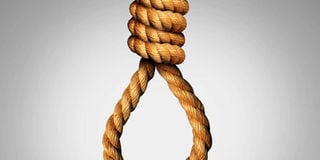Premium
Alarm over rise of suicide cases in Laikipia

Concerns have been raised over increase of suicides in Laikipia County. PHOTO | FOTOSEARCH
Suicide cases have shot up in Laikipia County in recent times even as the world marks Suicide Prevention Day tomorrow on Saturday, September 10.
County Commissioner Joseph Kanyiri says the region is recording three suicides a week, raising concerns among health workers and administrators.
In one case in the last week of August in a village in Laikipia West sub-county, a father killed his 12-year-old son before hanging himself with a rope.
Mr Kanyiri said Joseph Mwangi Maina, 42, left a three-page suicide note explaining that he had taken his own life and that of his Grade Four son following disagreement with his wife.
The incident occurred in Karaba sub-location, near Rumuruti town.
The man’s wife had left the family after her husband accused her of being unfaithful.
In another case, in African village in the same area, Ann Mumbi, wife to Peter Kiboi, hanged herself at the couple’s home with a rope on September 2. She did not leave a suicide note.
Elsewhere, Mr Anthony Murimi, 27, is fighting for his life after surviving what authorities believe was a suicide attempt.
On that fateful evening in Murera village, Laikipia Central sub-county, Mr Murimi took a six-kilo gas cylinder to a bathroom located outside their rented house and locked himself inside. He then released the liquefied petroleum gas, and when he felt it was well saturated in the air, he lit a matchstick, resulting in an explosion that left him with severe burns.
“He was rescued when his wife raised the alarm and rushed to Nanyuki Teaching and Referral Hospital, but he was later transferred to another medical facility outside the county for specialised treatment. If he survives, he will live with permanent scars on his body,” Mr Kanyiri said.
Statistics from the Ministry of Health and the World Health Organisation (WHO) show a worrying trend in the past few years, with young and old men and women, the poor and the rich, single and married people equally ending their lives prematurely, mainly driven by anxiety disorders.
Speaking during World Suicide Prevention Day in 2020, Health Cabinet Secretary Mutahi Kagwe said the suicide rate in Kenya was 6.5 suicides per 100,000 people, putting the annual statistics way below the figures reported in the months preceding the event.
“Here in Kenya, the numbers of suicide cases have increased in the past several years,” Mr Kagwe said.
“A report by the WHO indicated that the number of suicides reported across the country rose by 58 percent between 2008 and 2017. There are 317 suicides reported every year.”
The Ministry of Health does not have recent accurate data, with Department of Mental Health estimating the average annual cases of death by suicide at 400.
“The figures we have at the moment put the annual cases of suicide at 400, which might not be accurate. There is a need to invest in collecting data of suicide cases countrywide so that we can formulate effective strategies while dealing with this vice,” said Dr Florence Jaguga, a psychiatrist.
Dr Jaguga, who spoke during a virtual meeting organised by the Ministry of Health on Friday, attributed the rise in suicide cases to stigmatisation catalysed by the criminalisation of suicide attempts.
“In Kenya, suicide or attempted suicide is still treated as a criminal offence under Section 226 of the penal code, with convicts facing a two-year jail term,” Dr Jaguga said.
“Suicide should be treated as a health issue where the victims require medical attention rather than condemning a mentally unstable person to prison.”
Dr Simon Njuguna, the director of mental health at the ministry, speaking in the same virtual meeting, said it was time policy on health care financing was changed to support mentally unstable patients.
“We know currently there is a lot of discrimination happening, especially with the private insurance, where in case you end up in hospital with attempted suicide, they may decline to pay for your hospital expense,” Dr Njuguna said.
“I would like to point out that this is a crime under Kenyan law. The current Mental Health Amendment Act of 2022 stipulates that any provider of insurance services who discriminates against a person on the ground of mental health whether suicidal behaviour or suicide attempt commits a crime.”
He advised those who are discriminated against to take the matter to court, adding that there is work in progress to improve coverage in the National Hospital Insurance Fund (NHIF) so that inpatients and outpatients, including those seeking treatment or rehabilitation for substance use and abuse, can benefit from this insurance cover.
Participants called for suicide awareness campaigns across the country where gatekeepers such as teachers, chiefs and religious leaders would be educated on how to identify suicidal behaviour and make timely interventions.
“Most suicide do not occur suddenly. There are always warnings that precede it and those are signs the community at the village level need to be educated on so that victims can be encouraged to seek medical treatment before it is too late,” said Ms Rachel Maina, a clinical psychologist.




